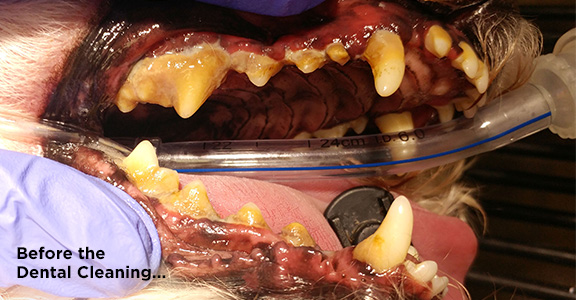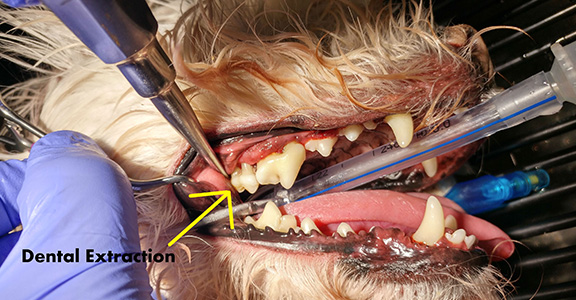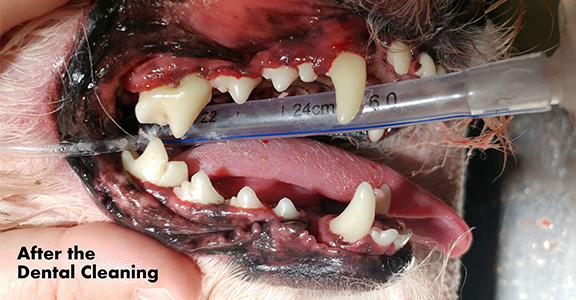If your pets are anything like mine, chances are they love food. Unfortunately, so do bacteria! And when food gets stuck in the crevices between your pet’s teeth or below the gum line, bacteria take advantage of that ready supply. To make matters worse, pets rarely agree to brush their own teeth. Your pet’s mouth is therefore the equivalent of a bacterial sanctuary – safe, secure, and with plenty of food. How then do we protect your pet’s teeth and gums against otherwise-inevitable decay?
The first and most important item is done at home – brushing! Brushing provides the same benefits for your pet’s dental health that it does for us: namely, it can remove the sticky film of plaque from your pet’s teeth before it hardens into tartar, and it can reduce the number of bacteria in your pet’s mouth. While pet dental treats and water additives can help to a certain degree, a good pet toothpaste and brush are far more effective at keeping your pet’s mouth clean.
If you’ve never brushed your pet’s teeth before, or if you have tried and had little success, here are some tips that hopefully will make the process easier:
- Obtain a proper toothbrush and toothpaste. Even children’s brushes are generally too hard for your pet. The ideal brush will be pet-specific with a handle long enough to reach your pet’s back teeth and extra soft bristles. Smaller dogs and cats may benefit from a finger brush. Pet toothpaste should contain an enzyme to help control plaque. It is best not to use a human toothpaste, as they may contain ingredients that are not good for your pet.
- Start early! Most pets are accepting of tooth brushing when they are young. However, even adult pets can learn to accept the brushing process if you start off slow and provide lots of praise when finished. You can begin the acclimation process by using a cloth or gauze square to wipe the teeth at first. Praise your pet both during and after the process. You can also offer dental-friendly treats after brushing (dental chews or green beans). Do this process twice a week until your pet is acclimated. Next, start using the toothbrush soaked in warm water. Use the brush on a daily basis, first on a small area of your pet’s mouth and gradually increasing the treated area until your pet tolerates having its entire mouth brushed. Once your pet accepts having its mouth brushed with warm water, it is time to add the toothpaste.
- Use good brushing technique. Try to get the toothpaste between the bristles of the brush. Pay most attention to the outsides of the teeth. Place the bristles at a roughly 45 degree angle where the gums meet the tooth, and brush in an oval pattern. Cover three to four teeth at a time, and gently brush ten times in an oval pattern before moving to the next area.
The second aspect of pet dental care is the veterinary dental cleaning. The process is actually much more than a cleaning, as it involves a thorough assessment and charting of the mouth and teeth; scaling off tartar above and below the gum line; and polishing the teeth after cleaning. Veterinarians refer to the process as the oral ATP, which stands for comprehensive oral assessment, treatment and prevention.

As many owners know, the ATP sometimes involves the extraction of diseased teeth as well. The roots of a dog or cat’s teeth can be quite well-anchored. When necessary, we utilize surgical extraction techniques to ensure all of the tooth, including root tips, are extracted. We will discuss all aspects of tooth extraction and post-operative care in the event extractions are warranted.

A proper ATP is performed under anesthesia, as no self-respecting cat or dog will allow someone to remove tartar from underneath the gum line while awake. North Hills Animal Hospital & Resort takes pride in the precautionary steps we take ensure your pet’s cleaning is safe and worry-free. Please feel free to ask one of our veterinarians or technicians about our anesthetic protocols – we will be glad to discuss them with you.

Daily brushing, plus an oral ATP when needed, provide the best chance to keep your pet’s mouth clean, healthy and smelling fresh. North Hills Animal Hospital & Resort carries a range of dental products for your pet, including toothpaste, brushes and treats. We also offer a discount on dental cleanings during the months of February and October. Let’s work together to keep your pet’s teeth pearly white!

